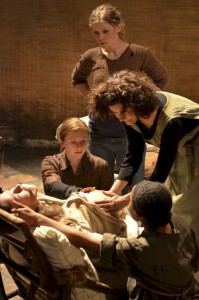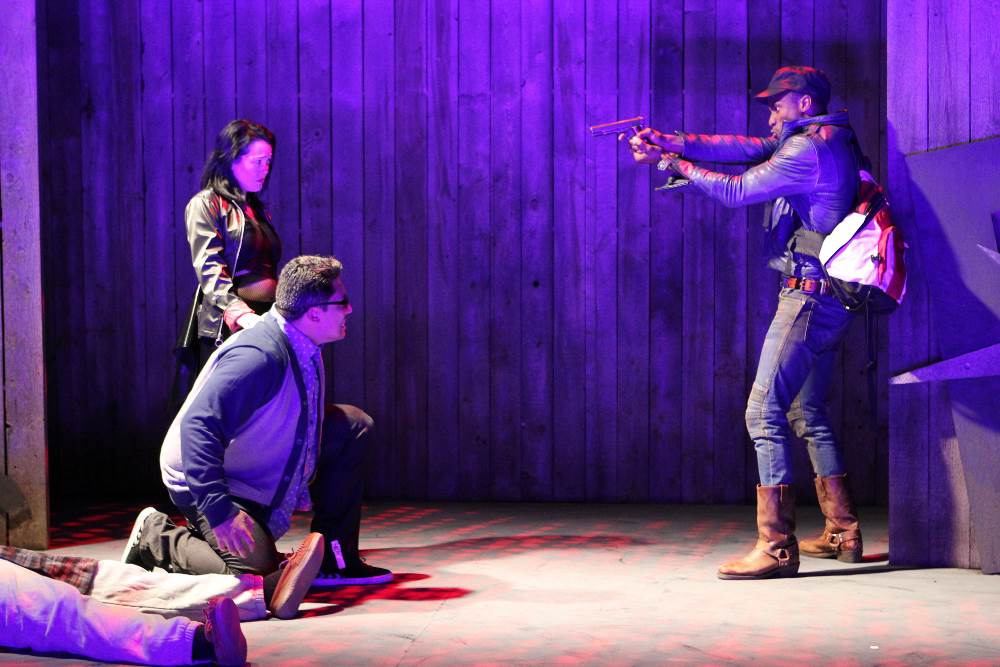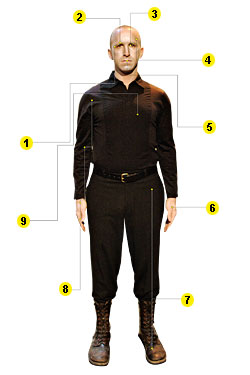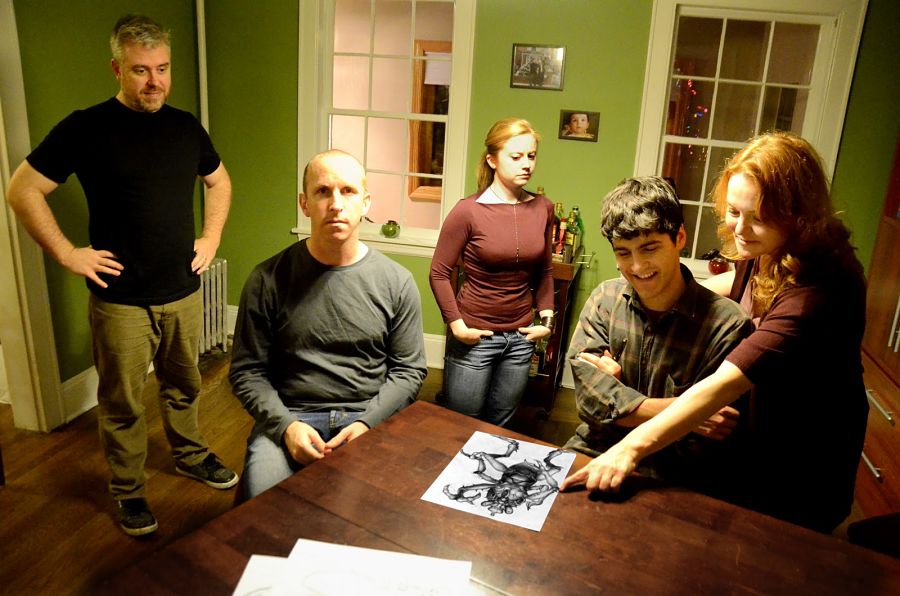So I wrote this three-play cycle about giant insects taking over the world. No, I’m not kidding. As I write, director Jordana Williams is in the midst of a 12-hour marathon of directing all three parts, and scenic designer Sandy Yaklin is overseeing the creation of glowing alien plants. This is happening.
The Honeycomb Trilogy, which played to great acclaim in 2012 and returns this month to the Gym at Judson in New York City (Oct. 13–Nov. 14), chronicles an extraterrestrial occupation of Earth. Part 1 (Advance Man) is set just before the invasion, Part 2 (Blast Radius) takes place 12 years later on an alien-conquered Earth, and Part 3 (Sovereign) picks up 8 years after that, as the remnants of the human race make a pivotal decision.
A bunch of you are probably thinking, “That’s a description of a play?” But maybe not so many of you as would have thought that even 15 years ago. Because science fiction—long a disreputable genre that mostly appeared on stage as camp —is turning up more and more in new playwriting. The Honeycomb Trilogy can’t lay any claim to the linguistic/anthropological approach of Anne Washburn’s Mr. Burns, a post-electric play or the speculative-fiction structure of Jennifer Haley’s The Nether. Honeycomb is straight-up pulp sci-fi about bugs conquering the world. And I stand by every word. Science fiction belongs in theatre.
Let me show you how it’s done in 7 essential steps:

7. It needs to be theatre.
I left something out of the description of The Honeycomb Trilogy above: The entire saga takes place in the same American living room. Because the living room, where families fall apart as secrets are revealed, is one of theatre’s staples. And sci-fi theatre must be theatre. Don’t give in to the temptation to imitate TV, film, or fiction. Theatre has its own tools. Accordingly, I modeled each play after a sturdy theatrical tradition. Advance Man is an O’Neill/Albee living-room play invaded by aliens; Blast Radius is a twisted take on the Shakespearean pastoral, with nobles, commoners, disguises, and a wedding-packed conclusion; and Sovereign—a real-time thriller about a faded ruler buckling under hubris and the previous generation’s sins—borrows shamelessly from Greek tragedy. I used these forms to tell a science-fiction story because theatre has honed them for centuries, and they work.
6. Take inspiration from your colleagues.
More and more playwrights are writing science fiction. In addition to Washburn’s and Haley’s plays, read Liz Duffy Adams’ Dog Act and August Schulenburg’s DEINDE as soon as you can. Honeycomb was significantly influenced by Caryl Churchill’s grounding of outlandish sci-fi ideas within relatable family structures in her plays Far Away and A Number. But I owe my biggest debt to Qui Nguyen and Robert Ross Parker’s work with the Vampire Cowboys Theatre Company. Their unabashed commitment to their comics-oriented approach gave me the courage to tackle the bigger-than-life stories in my own head. I remember looking at the audience before one of their plays, bouncing in their chairs. My first thought: “They don’t look like they’re at a play.” My second: “That’s how I want to make my audiences feel.”

5. The story is in the reactions.
In any sci-fi play, you’re going to have to do some conceptual world-building. But don’t go crazy with the explanations, because the story is really in the reactions the characters have to the sci-fi concepts. Are they frightened? Angry? Horny? Answer that question, then make those reactions land hard. The audience can sort out the details at the bar later. During the show they’ll be worried about how the characters feel, and what they’re going to do next. At the same time:
4. Remember the audience is savvy.
Outside the theatre, geek entertainment dominates popular culture. Even if clones and teleports aren’t your cup of tea, chances are you’ve seen a bit of some sci-fi show or read a science news report that used genre references in its reporting. You don’t need to over-explain an alien possessing a human body or a robot discovering its humanity, because most consumers of entertainment have been repeatedly exposed to these kinds of stories. Your audience will quickly accept the trope, then watch to see if you do something interesting with it.

3. The human body is your best special effect.
There’s no overstating the value that a great design team (and we have a phenomenal one on Honeycomb) can bring to your sci-fi play. But the definitive instrument of science fiction onstage—one you can draw upon on any budget—is the actor’s face and body. My play Universal Robots followed the evolution of a robot named Radius as he undergoes several upgrades that increase his capacities. The actor who played Radius, the sublime Jason Howard, meticulously designed a physicality for the robot that was severely limited in the early scenes, but grew more graceful and adept over the course of the play. No amount of makeup or costume changes could have expressed Radius’s dawning humanity as eloquently as Jason’s physical choices. That’s why I’m glad he’s back in The Honeycomb Trilogy carrying out another uniquely challenging metamorphosis.
2. Don’t apologize that it’s sci-fi.
1. Don’t apologize that it’s a play.
Chances are if you’re writing a science-fiction play, you’re picturing one of two sneering audiences in your head: a snooty theatre crowd looking down its nose, or a hip-geek sci-fi crowd rolling its eyes the idea of a play. And sure, there are some people like that, but fewer than you think. If you want to write sci-fi for the stage, you need to be able to say two things without wincing:
“Science fiction belongs in theatre.”
and
“Theatre matters.”

That’s the gauntlet we threw down with The Honeycomb Trilogy, and it worked. We got great reviews and appreciative crowds. We got people to invest in this story, this family, these characters, despite the fact that they spent the entire three-play cycle fighting giant bugs. You know why? Because we weren’t ashamed of it. Because giant bugs are awesome. Because science fiction is worthy of theatre, and theatre is worthy of your time. Don’t even start writing theatrical sci-fi unless you can say the same. People will spot it if you don’t believe in what you’re doing.
But they’ll love it if you do.


